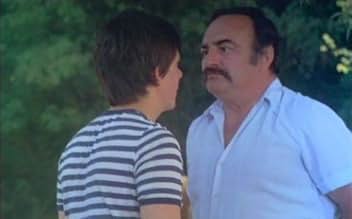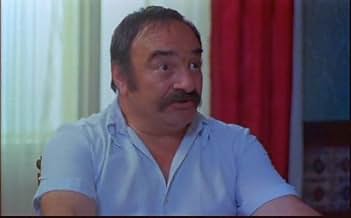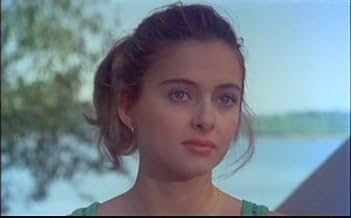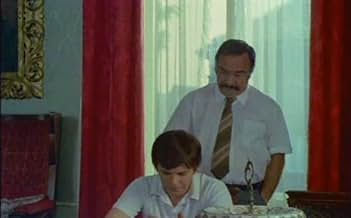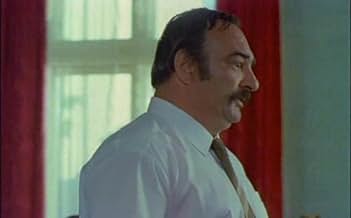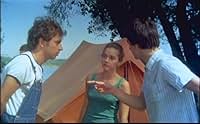NOTE IMDb
8,4/10
6,5 k
MA NOTE
Ajouter une intrigue dans votre langueFor the young man who lives in Serbian province town, the maturing coincides with the turbulent political events of the year 1968.For the young man who lives in Serbian province town, the maturing coincides with the turbulent political events of the year 1968.For the young man who lives in Serbian province town, the maturing coincides with the turbulent political events of the year 1968.
- Réalisation
- Scénario
- Casting principal
Sanja Vejnovic
- Ruzenjka Hrabalova
- (as Sanja Vejinovic)
Avis à la une
This is not a good Yugoslav movie and certainly not a representative one. Main actors (mother and father) reprise their roles from Balkan Spy (albeit bloodless and pale here) and the rest doesn't even come near the wits of the movies based on Dusan Kovacevic's work (Balkan Spy, Who's Singin' There?, or Marathons) or other truly clever movies from the period before war on Balkans (for example, Underground). It's not even funny. A classic "coming of age" core topic was much better presented in any other (especially Italian) movie. In good (writing) hands, with different casting and so on this could have been a good movie. But it simply isn't. Pity.
Following the Summer of Love in 1967, 1968 was vastly different. The assassinations of Martin Luther King Jr and Bobby Kennedy, the student uprising in Paris, the protest at the Democratic National Convention in Chicago, the Soviet invasion of Czechoslovakia, the massacre of protesters in Mexico City right before the Olympics got held there, all culminating in Nixon's election.
Goran Paskaljević's "Varljivo leto '68" ("The Elusive Summer of '68" in English) indirectly looks at this. The protagonist is Petar, a teenage boy in Yugoslavia. His dad, while a Marxist, is nonetheless the type who thinks that the younger generation doesn't appreciate what the parents' generation did (sort of an Archie Bunker in that sense). Petar is flunking Marxism in school, due to his interest in women. This ranges from his teacher, to a young woman in a bakery (resulting in the movie's best scene). But this is all amid the turbulent events that took place that summer. Early in the movie the family sees the Paris uprising on the news, and towards the end there's news that the Warsaw Pact armies have entered Prague.
I'd say that this story could've taken place in almost any country. It's well known that the '60s were all about sexual awakening and protests, much of it scorned by the parents' generation. Indeed, the movie shows some of the protests that took place in Yugoslavia. We even hear "The Blue Danube" played while the family is on the beach (I wonder if this was a reference to "2001: A Space Odyssey").
Anyway, it's not a masterpiece, but still worth seeing. I don't know how widely available it is; I saw it online.
Goran Paskaljević's "Varljivo leto '68" ("The Elusive Summer of '68" in English) indirectly looks at this. The protagonist is Petar, a teenage boy in Yugoslavia. His dad, while a Marxist, is nonetheless the type who thinks that the younger generation doesn't appreciate what the parents' generation did (sort of an Archie Bunker in that sense). Petar is flunking Marxism in school, due to his interest in women. This ranges from his teacher, to a young woman in a bakery (resulting in the movie's best scene). But this is all amid the turbulent events that took place that summer. Early in the movie the family sees the Paris uprising on the news, and towards the end there's news that the Warsaw Pact armies have entered Prague.
I'd say that this story could've taken place in almost any country. It's well known that the '60s were all about sexual awakening and protests, much of it scorned by the parents' generation. Indeed, the movie shows some of the protests that took place in Yugoslavia. We even hear "The Blue Danube" played while the family is on the beach (I wonder if this was a reference to "2001: A Space Odyssey").
Anyway, it's not a masterpiece, but still worth seeing. I don't know how widely available it is; I saw it online.
10ereinion
This movie will always stay in my memory as one of the funniest and best comedies I ever saw back in former Yugoslavia. It centers around the eldest son (Stimac) of a family led by a strict authoritarian father in Danilo Bata Stojkovic's magnificent incarnation. The young Petar struggles to graduate from high school mainly for one reason-he is so infatuated with his Marxism teacher that he cannot think of anything else but her during the classes. So when the graduation time comes, he lies to his father about passing in all the subjects while in reality flunking in Marxism.
Of course, the truth is not easy to hide and when it eventually comes out, his father is appalled and decides to punish him and lead his mind off from girls by finding a job for him in a local bakery. But that becomes complicated too when it turns out a beautiful and voluptuous girl is working there and she is an easy catch as well! Complications and comical twists just keep coming and coming here and the laughter never ceases.
All this is going on during a very turbulent time, the '68 student revolution. My favorite scene is when Stojkovic throws out the TV because of the student uprising claiming it's immoral to watch it and then when Tito approves of the reforms he brings it back saying "Comrade Tito has said that the students are right. We can watch television again!" Paskaljevic was a master of socio comedy and all the actors do a great job. The ending is specially great and this is probably Slavko Stimac's best role.
Of course, the truth is not easy to hide and when it eventually comes out, his father is appalled and decides to punish him and lead his mind off from girls by finding a job for him in a local bakery. But that becomes complicated too when it turns out a beautiful and voluptuous girl is working there and she is an easy catch as well! Complications and comical twists just keep coming and coming here and the laughter never ceases.
All this is going on during a very turbulent time, the '68 student revolution. My favorite scene is when Stojkovic throws out the TV because of the student uprising claiming it's immoral to watch it and then when Tito approves of the reforms he brings it back saying "Comrade Tito has said that the students are right. We can watch television again!" Paskaljevic was a master of socio comedy and all the actors do a great job. The ending is specially great and this is probably Slavko Stimac's best role.
A communist romantic comedy who proves again in communism there's no such a thing as censorship. Whose who say there was censorship in communism are brainwashed by capitalistt propaganda.
This movie has a cult status in former Yugoslavia for no reason whatsoever. It's just one of many unsuccessful movies done by so-called Prague school directors ( Paskaljevic, Grlic, Karanovic) that were out of touch with modern cinema and the world itself.
Le saviez-vous
- AnecdotesAs of 2016 it was included in the #100 Serbian movies list (1911-1999) and protected as cultural heritage of great importance.
- ConnexionsReferences Un été 42 (1971)
Meilleurs choix
Connectez-vous pour évaluer et suivre la liste de favoris afin de recevoir des recommandations personnalisées
- How long is The Elusive Summer of '68?Alimenté par Alexa
Détails
- Date de sortie
- Pays d’origine
- Langues
- Aussi connu sous le nom de
- The Elusive Summer of '68
- Lieux de tournage
- Sremski karlovci, Serbie(on location)
- Société de production
- Voir plus de crédits d'entreprise sur IMDbPro
Contribuer à cette page
Suggérer une modification ou ajouter du contenu manquant

Lacune principale
By what name was Mes amours de 68 (1984) officially released in Canada in English?
Répondre
